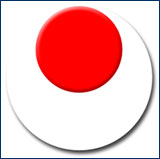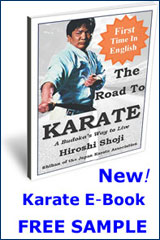|
Gichin Funakoshi - Karate Master1868 - 1957. The Father of Modern Karate
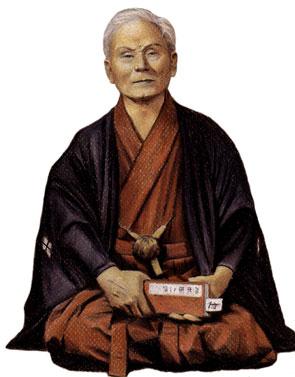
As much as we read about martial arts history, the history of Karate itself is not exactly ‘ancient’. 150 years of reliable records can be divided roughly into 3 eras.
- Pre 1920 - 1920 to 1950 - 1950 onwards... All three eras involve the diminutive Okinawan who became known as the Father of Karate-do, supreme master “Shoto” Gichin Funakoshi Sensei. Funakoshi was such an influential figure that his teachings are claimed to be the foundations of many Karate styles. The name Gichin Funakoshi means something to all traditional Karate styles. Whether he was influenced by the great teachers of the Goju tradition, whether he favored one University faction over another, or whether he approved of the course his students took toward the end of his life, one thing is clear; he is the major figure in the development of Japanese Karate. Image of Funakoshi Sensei Courtesy of Louis Sollune. Watch Old Footage of Gichin Funakoshi (c1924)... Not the best quality - but fascinating stuff as you will see. When you get over laughing at the loin cloths, take a look at the physique on these dudes and remember this film was shot only a handfull of years after Karate was introduced into Japan..! Early Years
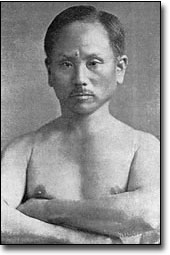
Gichin Funakoshi was born in Shuri Okinawa in 1868. He was weak child. His parents took him to a local teacher, The family doctor Tokashiki, prescribed local herbal remedies to strengthen him. This and his instruction in Karate technique, soon saw young Funakoshi becoming strong and healthy. He went on to become an academic - a schoolteacher. He also decided at an early age to begin a lifelong study of the fighting arts of the Ryu-Kyu islands. When Funakoshi came to mainland Japan from Okinawa in 1922 he was 53 years old. He opened his first school in Meishojuku where he taught 15 kata: 5 pinan also known as the Heian kata, 3 Naihanchi (Tekki), Kushanku (Kanku), Seishan (Hangetsu), Patsai (Bassai), Wanshu (Empi), Chinto (Gankaku), Jutte (Jitte) and Jion. Funakoshi soon gained a reputation as a Karate master. He insisted on 'hito-kata sanen' meaning to practice three years on one Karate kata believing that it would take a lifetime to master a handful of kata. "Shoto Kan" Dojo Established Gichin Funakoshi then opened a Dojo in Mejiro called the "Shotokan" (Shoto was his pen-name and 'kan' means place of practice). The Shotokan produced a great number (for the time) of students, such as Takagi, Nakayama and Yoshida later of Takudai, Obata later of Keio, Shigeru Egami later of Waseda, Hironishi later of Chuo, Noguchi later of Waseda, and Hironori Ohtsuka founder of the Wado Ryu Karate style. 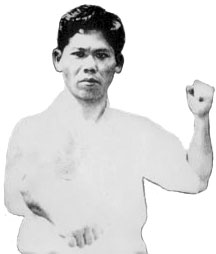
In his travels around Japan Funakoshi sensei gave dozens of demonstrations and lectures. He always had a core group including the above Karateka as well as Takeshi Shimoda and his son Yoshitaka Funakoshi aka Gigo (pictured right) accompanying him. Gigo was reputed to have Karate kata of a very high standard. His Karate technique heavily influenced the future of the Shotokan style. Despite passing away at age 39 in 1945 of tuberculosis, Yoshitaka like his father, became a major figure in the history of Karate. Japanese Karate Recognized In 1924, Karate was introduced into Keio University as the first collegiate Japanese Karate Dojo. From there, others opened including Chuo, Waseda, Hosei, Tokyo University and Takushoku. By 1941 Karate was formally recognised as one of the Japanese martial arts. After this many more Dojos flourished on mainland Japan.
Approximately one hundred Kodokan seniors watched the performance. Gima, who had studied under Yabu Kentsu as a youth in Okinawa, performed and explained the practical applications Karate Bunkai of the Karate kata Tekki Shodan. Funakoshi sensei did the same with the kata Kanku Dai. Kano sensei watched the performance carefully and was greatly impressed. He asked Funakoshi sensei to explain the techniques in detail. This was taken as an acknowledgement that the art of Karate had been accepted by one of the most influential authorities of the time in Japanese martial arts.
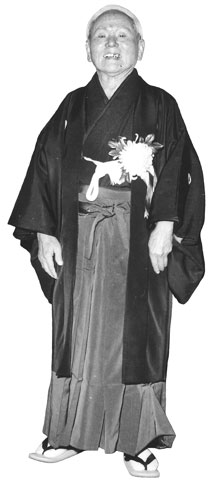
The Later Years By the late 1940's, the foundations of a new organisation the Nihon Karate Kyokai or Japan Karate Association were being laid by his students. When the JKA came to prominence Gichin Funakoshi was into his later years but he assumed the leading role in a group that was to become the pre-eminent world authority on Japanese Karate. Gichin Funakoshi - Legacy Gichin Funakoshi was a humble man full of life and awareness. He preached and practiced the essential humility of an individual who was rooted in the true perspective of things. He placed no emphasis on competition preferring to allow his successors, a group of much younger men led by Nakayama Masatoshi Sensei, to lay down the first rules of competitive Karate. His prime concern was individual self-perfection and he believed in the common decency and respect that one human being naturally owes another. He was more than a Karate master, he was the master of masters – a true legend of martial arts history. Gichin Funakoshi died in 1957 at the advanced age of 89, after making by far the largest contribution to the art of Karate-Do in the modern era. Back to Top of Page Back from Gichin Funakoshi to Karate - Home |





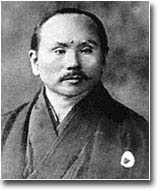 Dr. Jigoro Kano, the founder of modern judo, once invited Gichin Funakoshi and a friend, Makoto Gima, to perform Karate technique at the headquarters of Judo the Kodokan.
Dr. Jigoro Kano, the founder of modern judo, once invited Gichin Funakoshi and a friend, Makoto Gima, to perform Karate technique at the headquarters of Judo the Kodokan. 